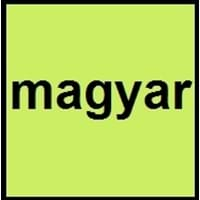Navajo vs Hungarian
Countries
United States of America
European Union, Hungary, Serbia, Vojvodina, Serbia
National Language
United States of America
Austria, Gambia, Hungary, Romania, Serbia, Slovakia, Slovenia, Ukraine
Second Language
Not spoken in any of the countries
United States of America
Speaking Continents
North America
Africa, Europe
Minority Language
Not spoken in any of the countries
Austria, Croatia, Romania, Slovakia, Slovenia, Ukraine
Regulated By
Not Available
known, Research Institute for Linguistics of the Hungarian Academy of Sciences (Magyar Tudományos Akadémia Nyelvtudományi Intézete)
Interesting Facts
- Navajo language is tonal language, as it heavily relies on pitch to distinguish between similar words.
- Navajo ethinc group is 2nd largest Native American group.
- Hungarian language has only preserved most of its ancient elements.
- 'Magyar' is the Hungarian name for the language, the 'Magyar' is also used as an English word to refer to Hungarian people.
Similar To
Apache Language
Mansi and Khanty Languages
Derived From
Not Available
East and South Slavic Languages
Alphabets in
Navajo-Alphabets.jpg#200
Hungarian-alphabets.jpg#200
Writing Direction
Not Available
Left-To-Right, Horizontal
Thank You
Ahéhee'
köszönöm
How Are You?
Ąąʼ haʼíí baa naniná?
Hogy vagy?
Good Night
Yá'át'ééh hiiłchi'į'
Jó Éjszakát
Good Evening
Yá'át'ééh ałní'íní
jó Estét
Good Afternoon
Yá'át'ééh
Jó Napot Kívánok
Good Morning
Yá'át'ééh abíní
jó Reggelt
Please
T'aa shoodi
Kérlek
Sorry
Not available
bocsi
I Love You
Ayóó ánííníshí
Szeretlek
Excuse Me
Shoohá
elnézést
Where They Speak
Arizona
Bacău County, Rumania
Dialect 2
Navajo2
Oberwart
Where They Speak
New Mexico
Austria
Dialect 3
Navajo3
Székely
Where They Speak
Utah
Székely Land
Speaking Population
Not Available
Second Language Speakers
Not Available
Native Name
Diné Bizaad / Dinék'ehjí
magyar / magyar nyelv
Alternative Names
Navaho
Magyar
French Name
navaho
hongrois
German Name
Navajo-Sprache
Ungarisch
Pronunciation
Not Available
[ˈmɒɟɒr]
Ethnicity
Navajo people
Hungarians
Language Family
Dené–Yeniseian Family
Uralic Family
Subgroup
Athapascan
Finno-Ugric
Branch
Not Available
Ugric
Early Forms
No early forms
Old Hungarian
Standard Forms
Navajo
Modern Hungarian
Language Position
Not Available
Signed Forms
Navajo Sign Language
Not Available
Scope
Individual
Individual
ISO 639 6
Not Available
Not Available
Glottocode
nava1243
hung1274
Linguasphere
No data available
ohu
Language Type
Living
Living
Language Linguistic Typology
Subject-Object-Verb
Subject-Object-Verb
Language Morphological Typology
Fusional, Polysynthetic, Synthetic
Agglutinative, Synthetic
Navajo and Hungarian Language History
Comparison of Navajo vs Hungarian language history gives us differences between origin of Navajo and Hungarian language. History of Navajo language states that this language originated in 1500 CE whereas history of Hungarian language states that this language originated in 1192 AD. Family of the language also forms a part of history of that language. More on language families of these languages can be found out on Navajo and Hungarian Language History.
Navajo and Hungarian Greetings
People around the world use different languages to interact with each other. Even if we cannot communicate fluently in any language, it will always be beneficial to know about some of the common greetings or phrases from that language. This is where Navajo and Hungarian greetings helps you to understand basic phrases in Navajo and Hungarian language. Navajo word for "Hello" is Yá'át'ééh or Hungarian word for "Thank You" is köszönöm. Find more of such common Navajo Greetings and Hungarian Greetings. These greetings will help you to be more confident when conversing with natives that speak these languages.
Navajo vs Hungarian Difficulty
The Navajo vs Hungarian difficulty level basically depends on the number of Navajo Alphabets and Hungarian Alphabets. Also the number of vowels and consonants in the language plays an important role in deciding the difficulty level of that language. The important points to be considered when we compare Navajo and Hungarian are the origin, speaking countries, language family, different greetings, speaking population of these languages. Want to know in Navajo and Hungarian, which language is harder to learn? Time required to learn Navajo is 88 weeks while to learn Hungarian time required is 44 weeks.





